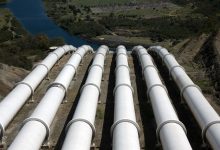The head of Snowy Hydro has apologised for large cost blowouts but has promised Australia’s largest renewable energy project will still show a return on investment for taxpayers.
The company revealed the cost of the troubled project had increased to $12 billion, six times more than what was originally budgeted.
When the project was announced in 2017 by former prime minister Malcolm Turnbull, it was expected to be finished in 2021, but now it’s not set to be finished until December 2028.
Snowy Hydro chief executive Dennis Barnes, who was appointed to the role in February, said he was confident the cost would not blow out further.
“Obviously (we’re) very disappointed in the cost increase, and of course we apologise for that, but bear in mind that this is an investment that the Australian taxpayer will get a return on,” he told ABC Radio on Friday.
“I’m very confident $12 billion (and) 2028 is a good target for us to achieve.”
The company said as of June $4.3 billion had been spent on the project, while 80 per cent had been reinvested into the economy.
It’s expected the first power from Snowy 2.0 would be delivered in the second half of 2027, while the whole project would be operational by the end of 2028.
Barnes said increased construction costs and flow-on effects from COVID-19 contributed to the cost blowout.
“We’ve done an awful lot of work, which is really rigorous work … we’ve learned a lot in the 40 per cent of the project we have completed, so it gives me a degree of confidence,” he said.
While there were “no guarantees”, he was comfortable with the trajectory of the incredibly complex project.
The energy project had been hampered by softer than expected ground, which had held up the tunnel boring machine.
Barnes said the project was waiting for approvals from the NSW government for modifications to the Snowy 2.0 plan to be able to continue tunnelling efforts.
So far, the machine had only moved 180 metres out of the planned 17km tunnel.
“We’ve been getting ready to move through this soft ground. We obviously take our environmental obligations incredibly seriously,” he said.
“We want to make sure that when we do move forward, we don’t encounter any problems.”
Energy Minister Chris Bowen said financial incentives had been offered for contractors who deliver services on time and on budget, while penalties would apply if targets were not met.
He told radio today: “The analysis shows that there’s still $3 billion net value, and of course is 40 per cent built, so it would be a huge waste of money to cancel it at this point.”
See also this analysis: Snowy 2 Much: How can a 2.2GW water battery be worth more than $12 billion?
AAP










